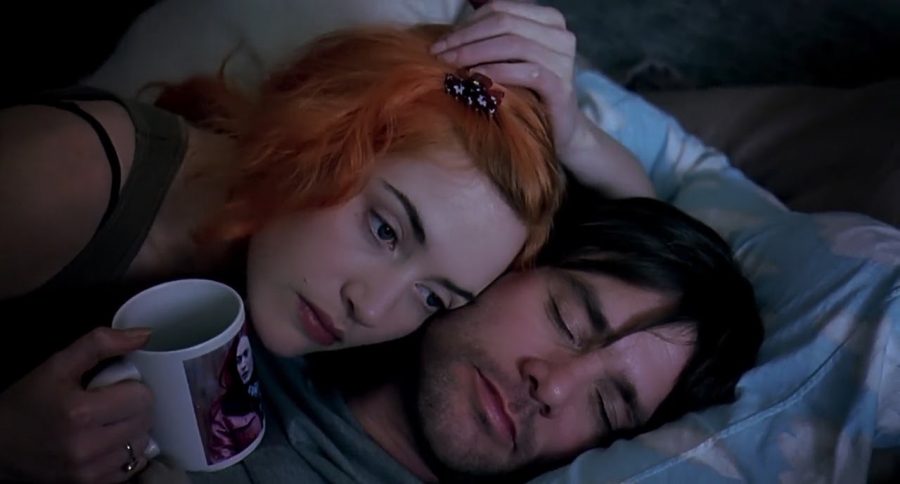Top five offbeat love stories on film
Arts Editor Harry Westergaard ’19 recommends five of his favorite films about love to view this Valentines season.
February 14, 2019
I hesitate to say that I like romantic films because of the cliches that have been attached to that label by popular cinema. Of course, love is a universal theme that just about everybody can relate to, so it makes sense that the suits at the big studios have been capitalizing off that for years. But that’s not to say that every single love story put to film is the product of cookie cutter industry fantasies. If you look in the right places, you will find films that break these preconceived notions, that have bold, original things to say about love in a sea of boring romcoms. This Valentines Day, I present you with a diverse list of five of my favorite love stories on film that get it right, in one way or another.
- If Beale Street Could Talk (2018)
The latest work from “Moonlight” director Barry Jenkins focuses on the relationship between Tish (Kiki Lane) and Fonny (Stephen James), who has been wrongfully imprisoned for a crime he didn’t commit. Though the film tackles some heavy themes, Jenkins keeps the story firmly rooted in the characters, and as with his previous feature, completely invests you in their struggles. The somber scenes in the present are offset by the intoxicatingly joyful scenes in the past. Nicholas Britell’s lush score helps to further lend such scenes a nostalgic melancholy. And being a Barry Jenkins film, it should be no surprise that every shot is filled to the brim with detail and artistry. He produces the type of movie where you could stop it at just about any frame and be faced with a worthy piece of art in its own right. “If Beale Street Could Talk,” is still playing in some select theaters; I would highly recommend you catch a showing if you could. It’s a marvel of a film to take in, aesthetically beautiful
- Swiss Army Man (2016)
“Swiss Army Man” doesn’t seem like much of a love story on the surface. It’s a strange story to begin with, following Paul Dano’s Hank, a man who is stranded alone on an island. His boring existence is spiced up one day when a corpse (Daniel Radcliffe) washes ashore. When it inexplicably reanimates, they form a special bond and set out on a quest to return home. I hate the word “bromance” with a passion, but I suppose that’s how you’d describe the relationship between Hank and Manny, the corpse. Aside from that, much of the film is concerned with the absence of love in the two character’s lives. Both are isolated and have to find solace in each other. The film is a startling yet charming mix of high and low art, potty humor and philosophical discourse, desperation and exuberance. The directors, credited simply as “Daniels,” are confident in their vision and know how to effectively maneuver between these moods without making the film seem gimmicky or insincere. I never thought I’d get emotional about the relationship between a socially awkward man and a farting corpse, but this movie proved me wrong.
- “Chungking Express” (1994)
The premise of Wong Kar Wai’s third film is simple. It follows the separate stories of two lonely, lovesick cops. Told back to back, the stories are seemingly unrelated on the surface but share similar themes. Wong’s strong visuals are what win you over as the viewer. He isn’t one to spoon feed the audience answers, or focus too heavily on the plot. If you are looking for such closure, you will surely be disappointed. The focus is on the tone created by his skilled prowess as a director. Through that, he gives you a dreamy, lushly realized snapshot of lovelorn Hong Kong life that is as beautiful as it is devastatingly melancholy. And while he’s at it, he gives you two unrelenting love stories that perfectly capture the yearning romanticism of Wong’s vision as a director. Despite the film’s influence upon other filmmakers of its generation all over the world, it’s rather hard to locate in the United States, legally at least. For those less skilled in the area of pirating, check out the director’s 2000 effort, “In the Mood for Love,” for an alternative taste of his style.
- “Harold and Maude” (1971)
Harold Chasen is an 18 year old obsessed with death, and in particular, repeatedly faking his own suicide. Maude is a 79-year-old woman who seems to be a leftover from the flower power hippie era, obsessed with saving trees and living life to its fullest. Over the ninety minute runtime of “Harold and Maude,” the two of them fall in love. This premise on the surface may offset some viewers, along with the fine line the film walks with its dark humor. Indeed, at the time of its release, critics and audiences didn’t know what to make of the film’s mixture of mocking deadpan and sincere emotions. But the film was wildly ahead of its time and remains one of the most unique stories about love (and just in general) put to film. Though the subjects of some of the jokes are dark, the emotions are genuinely heart warming and sweet. It’s a film that has to be experienced to be believed.
- “Eternal Sunshine of the Spotless Mind” (2004)
One of the greatest films of all time, “Eternal Sunshine of the Spotless Mind,” explores a relationship and it’s deterioration through the abstracts of the mind and memory. The plot takes an absurd but simple premise that many of us have probably considered. What if you could erase a messy relationship from your mind completely, saving yourself from the hardships of actually breaking up? Screenwriter Charlie Kaufman turns in arguably his strongest work, mixing his abstract themes with believable characters. The stellar script is bolstered by career-best performances from the two leads. Jim Carrey proves that he’s just as effective (if not more so) as an actor when he’s getting serious, and Kate Winslet is spunky yet complex as Clementine. The movie’s unconventional plotting makes the already intriguing premise even more engrossing. Plus, the movie offers a refreshing critique of valentine’s day. Through the surreal premise, the film presents one of the truer to life takes on romance in the film. An all-around masterpiece that improves on repeat viewings, there is no better film to compliment your Valentines Day.





